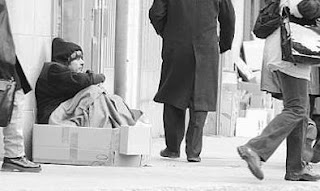
Do you hate terms like 'elastic job market' and 'human resources'? Have you ever read the 'Economist' and wondered why the word 'reform' is repeated like a mantra? If so, you might like this....
Once again, the start of the new year belongs to the peddlars good news. Although unemployment is rising they tell us that it is OK, since it could be rising faster. The same people regard current GDP growth of 2% as a success story, even though they recently forecast that it would be 5%, and that 3% growth would be a worst-case scenario. Whatever happens, things are good and they can only get better. If necessary, any failures can be presented as successes. Only malcontents and trouble-makers will complain.
It's not only the economy: In Iraq and Afghanistan, the US Army is fighting for peace and an end to terrorism. In Chechnya, on the other hand, we have freedom fighters and partisans, who Russia is fighting against in a deeply undemocratic manner. That is why sending Polish troops to fight alongside the US in Afghanistan is an honour and a wise investment, even if the few hundred million złoty spent means that scientific research and higher salaries for public workers become a luxury that we 'can't afford.'
Police violence against demonstrators is called 'ensuring public order.' On the other hand, violence carried out by shipyard workers against those institutions responsible for their fate is labelled hooliganism and banditry. Flying the Polish flag with the white eagle at football stadiums is a sign of healthy patriotism. Waving Russian flags in football stadiums is a worrying sign of growing Russian nationalism.
George Orwell had a name for this: Newspeak. The most famous example from '1984' include 'war is peace', 'freedom is slavery', and 'hate is power'.
Now it would appear that 'real capitalism' in today's Poland has its own brand of newspeak: Inequality is repackaged as 'equal opportunites in the market economy'. Laying off workers becomes 'cost rationalisation'. Cutting back on social spending is simply 'keeping public finances in order'. Worker's rights are defended by 'inflexible, self-interested trade unions.'
In a very interesting book, 'Neoliberal Newspeak', French sociologist Alain Bihr identifies 2 main functions of the current propaganda system. " On one hand, the aim is to invert the meanings of words and on the other to blur the meaning entirely....."
One is reminded of the Marxist observation that in every society 'the thoughts of the ruling class are the ruling thoughts'. This is why the rollling back of progressive social reforms, which were the result of decades of struggle, is itself called 'reform'. From the social point of view, reductions in benefits, longer working hours, privatised health care, tuition fees and other neoliberal policies represent a 'counter-reformation' harking back to the 19th century. Yet still the 'free media' clamours for more and more 'reform'.
Citizen! Your pension will be smaller and you will work longer but it is all for your own good. Don't you understand? You must be either an unreformed specimen of homus sovieticus or you do not listen enough to the 'free media'. The media, with the help of 'independent experts' from the Business Centre Club or the Adam Smith Institute will explain to you that working longer for less is in your best interests.
Naom Chomsky believes that propaganda plays a bigger role in democratic societies than in totalitarian regimes.... The stance of the 'free media' in Poland, dependent on large corporations, only serves to confirm Chomsky's opinion. Is it really possible to pull the wool over people's eyes and to silence thier voices? Luckily, not always and not with everyone.
Piotr Żuk is a journalist and sociologist. Translated by Czarny Kot 30/01/10
Source: 'Przegład' magazine.



